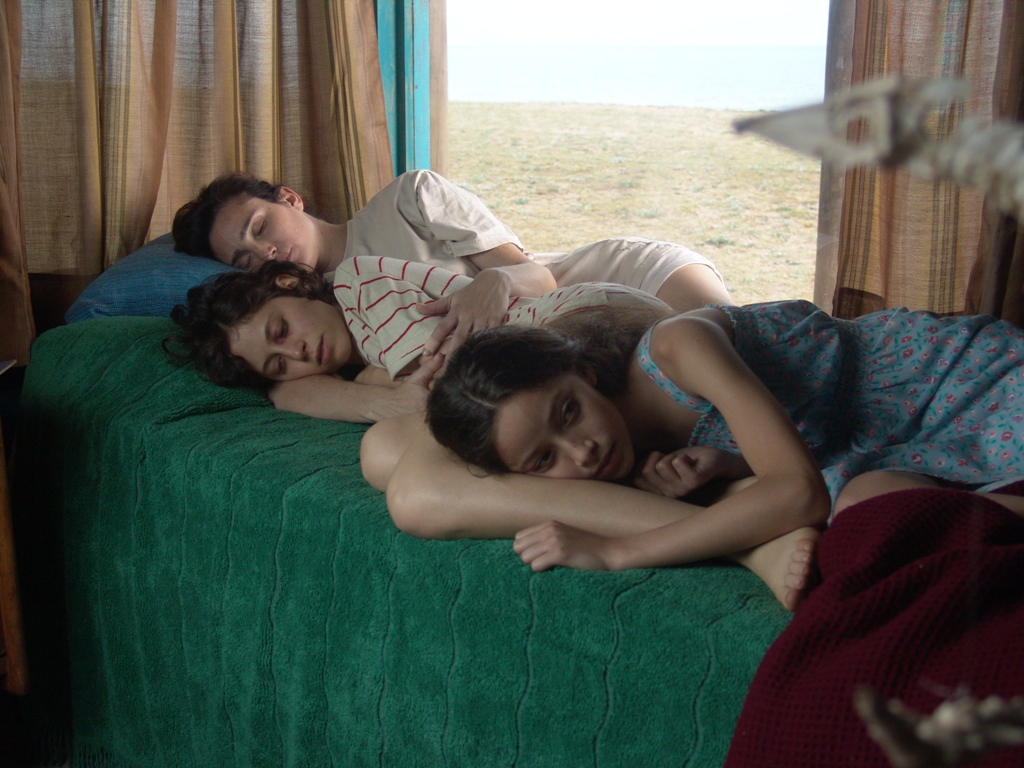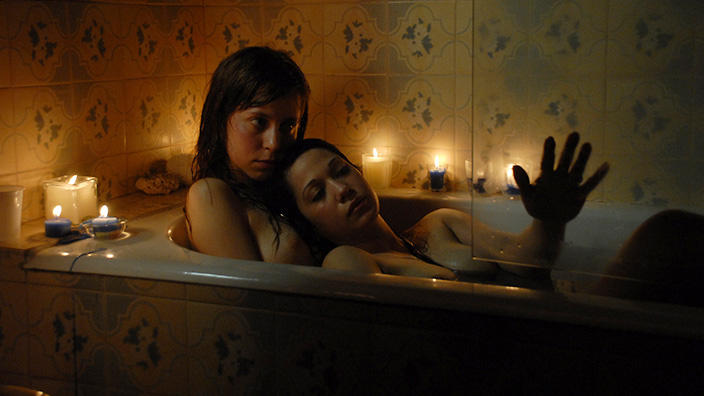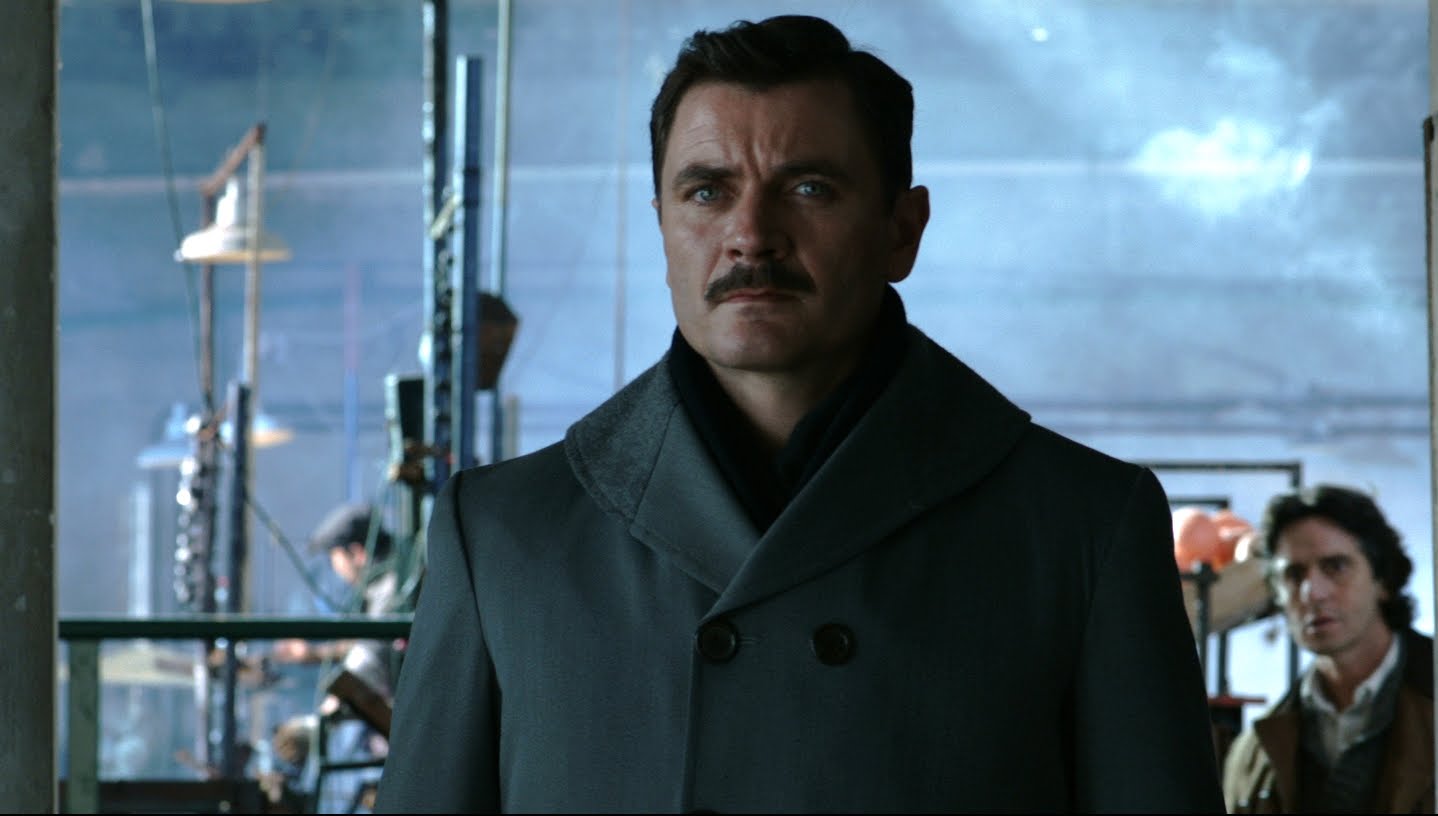This guest post written by Sara Century appears as part of our theme week on Women Directors.
Regardless of the time period or setting, there is a constant element of moody rebellion in the films of Lucia Puenzo; a deep-rooted distrust of authority that informs them at their core. Characters often become metaphors for larger issues of political strife. Good or bad, each individual’s humanity is shown via their shared vulnerability to forces outside of their control. Her work questions not only the desire to fit in, but asks why humans feel that desire to begin with. There is a tendency in her characters to challenge the status quo by their very existence in some way or another. As of this writing, she has written and directed 3 films, 2 of which were based on earlier novels of hers. She has also written a few screenplays, notably serving as one of the screenwriters on her father Luis Puenzo’s 2004 film The Whore and the Whale. Most recently, she co-created a television series in collaboration with her brother Nicolas for Argentina’s TV Publica called Cromo.
Puenzo’s solo directorial debut was 2007’s XXY, based on a short story by Sergio Bizzio. XXY is the story of an intersex teen who is raised with female pronouns, and how their family, friends, and lovers respond to their choice to stop taking hormones. The story begins with their mother and father inviting a plastic surgeon, his wife, and their son to stay with them in order to solicit advice on Alex. The plastic surgeon has an alienating affect on Alex and their family due to his disturbing lack of empathy for others, but his son Alvaro interests Alex, and they develop a mutual attraction. The narrative follows their interactions with one another as their self-discoveries coincide.
There are a plenty of heart-wrenching scenes in XXY but, in the end, it is most defined by its unwillingness to impose identities on its characters. Rather than defaulting to the gender binary, both Alex and Alvaro are given the option not to change, to exist simply as they are. By introducing another gender fluid character late in the film, Alex is shown in the context of a larger community, and accusations of abnormality from other characters seem to fall completely by the wayside. Up to that point, Alex lives in a world where society imposes an ideology that completely alienates them, and even their well-meaning parents tend to treat it as a burden to bear. Additionally, even their parents seem to believe that adherence to the norm is inevitable. By the time we meet the family, Alex would have been hearing these conversations for their entire life, and their alternating wordlessness or aggressiveness in response to these conversations comes across as understandable. The character studies in XXY are subtle and revealing, and critical response to the film was favorable, with many reviewers praising it for the tenderness with which it treats its characters.
This tendency towards deeply felt empathy has become a directorial trademark of Puenzo’s. Her follow up to XXY was the also fascinating The Fish Child, released in 2009. The Fish Child is an adaptation of her first novel, and follows Lala, the daughter of an influential judge. Lala is in love with her family’s maid, Ailin, who is roughly the same age as her, but from a much darker and more violent world. Lala’s father has been sleeping with Ailin as well, although their relationship is significantly less consensual. He is murdered, and Ailin is immediately blamed, which lands her in prison. Lala refuses to accept this fate for them, and determines to free Ailin. The film manages to fall into several genres at once; thriller, romance, drama, modern fairy tale. The dreamily in-and-out-of-focus cinematography and non-linear storytelling would even put it in the category of art house film. Connecting this work with her other films is the stylish aesthetic choices, and in this example in particular, the camera’s shifting focus and Puenzo’s meticulously chosen locations serve as characters in and of themselves, equally as defining to the overall tone as the dystopian political climate.
The Fish Child sees the return of Ines Efron, who played the lead, Alex, in XXY. She is equally compelling as the dreamy, naive Lala. The necessarily complicated relationship between Lala and Ailin is wildly endearing, conveyed expertly by both actors via body language as much by any part of the script. The commentary on Ailin’s position in life, and the way her poverty and history of sexual abuse has hardened her and limited her choices, makes her a fascinating character, and it’s easy to see why Lala falls for her. Ailin’s inner resolve and the way she switches quickly into survival mode is highlighted and contrasted by Lala’s optimistic naiveté. The two girls are very similar, but their outlooks and responses to conflict are separated at their very roots by the realities of class privilege, and this element of the film offers a sense of stark realism to this otherwise dreamy tale.
In 2013, Puenzo told her most ambitious story yet with The German Doctor, a fictional account of the infamous Nazi Josef Mengele. For those blissfully unaware, this is the man otherwise known literally as “The Angel of Death” in Auschwitz, where he conducted his famously horrific human experiments during World War II. After the fall of the Third Reich, it is well known fact that Mengele fled to Argentina, where he was protected by local authorities, civilians, and fascists still loyal to Hitler and the false science of eugenics. Based on her 5th novel, Wakolda, the film takes place during the months Mengele spent in or around Buenos Aires after the war. A young girl named Lilith, who is considered to be too small for her age, encounters a mysterious German doctor who promises her parents that he can make her grow. This should probably set off more alarms in her parents than it actually does, but, before long, he is conducting experiments on her as well as her recently birthed twin brothers. Watching this develop onscreen is absolutely chilling for anyone familiar with his history. At one point, he is shown sketching out plans for his monstrous experiments in a notebook while having a casual conversation with a child he intends to inflict them on. Small details such as that one stayed with me a long time after the credits rolled. The German Doctor succeeds in being utterly horrifying without ever even remotely resembling a horror film, which is an individual accomplishment in and of itself.
Also interesting is the way the development of the film seems to have been curbed at times by its own subject matter. In a 2014 interview with Elle, in anticipation of the film’s release, Puenzo openly discussed some of the conflict of speaking of history that some consider to be best left buried. She was quoted as saying:
“For example, we would have a location, but when we arrived, somebody had made a call and we didn’t have that location anymore. That happened a lot. Whoever was in charge had of course read the novel and knew we were mentioning the German School and that it actually existed before the war, and were very bothered by the idea. Another example was with the hotel that we shot the film in, which is also where we lived. We thought because it was closed for the holidays it would be a great proposition to rent that hotel. But in the beginning we were met with a lot of resistance. And then we found out that this hotel has a lot of German money in its origin — was made with German money. The whole time we were making the film we were confronted with facts of history, which made it very difficult to make.”
The German Doctor is a fascinating film, particularly when viewed as the culmination of the observations first made in XXY and The Fish Child. In XXY, the outside world is pressuring a young person to change something about their own bodies in order to fit in. In The Fish Child, the poor are shockingly vulnerable to the whims of the rich. Consistent with both, Puenzo’s sympathy is with the outsider. Uniquely, The German Doctor shows how the fear of not fitting in can lead to otherwise good people doing horrible things, for instance allowing Nazi war criminals to experiment on not one but three of their children.
In the end, it is this focus on individuality that is the most striking common theme of Lucia Puenzo’s works. Each of her characters undergoes intense scrutiny from outside forces, be it Alex in XXY for their gender, Lala in The Fish Child for her infatuation with Ailin, or Lilith from The German Doctor, who is quite literally forced into a physical transformation by a Nazi. In Puenzo’s films, each of these characters are threatened with the worst of all fates, which is to be just like everyone else. In each case, conformity is presented as being insidiously tantalizing. As in life, these seemingly benign choices will have a sweeping effect what kind of person each character will ultimately become.
This fascination with personal choice shows through in interviews with Puenzo. For instance, when asked in an interview with Indiewire in 2009 how she would define success, Puenzo responded, “Success for any artist is having a personal world that can be seen or felt in whatever they do,” and concluded that, “My personal goal is to be able to keep telling whatever story I want with no speculations but my own desire.” In a world where those outside of the norm are so often left voiceless, films like hers, which prize individuality above all else, are welcome and needed.
Sara Century is a multimedia performance artist, and you can follow her work at saracentury.wordpress.com.



1 thought on “Individuality in Lucia Puenzo’s ‘XXY,’ ‘The Fish Child,’ and ‘The German Doctor’”
Comments are closed.